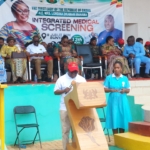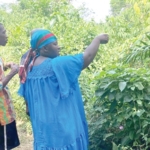
The Ghana AIDS Commission (GAC) is set to roll out the implementation of a National HIV Prevention Policy in 2026, Dr Kharmacelle Prosper Akanbong, the Director General of the Commission, has announced.
He said the policy implementation had innovative strategies of Pre-Exposure Prophylaxis (PrEP) and Post-Exposure Prophylaxis (PEP) that targeted key vulnerable populations, including Adolescent Girls and Young Women, as well as Adolescent Boys and Young Men.
Dr Akanbong said this when speaking at an integrated medical outreach campaign in Sunyani hosted by the First Lady, Mrs Lordina Dramani Mahama, explaining that the National Condom and Lubricants Strategy would also be implemented.
The office of the First Lady, in collaboration with the GAC and the Bono Regional Coordinating Council, organised the media outreach to promote early detection and prevention of HIV among adolescents and the wider community.
It sought to strengthen access to integrated health services tailored to the needs of young people and mothers, as well as raise awareness about healthy behaviours and preventive care.
Dr Akanbong explained that the execution of the lubricant strategy aimed at bringing essential services closer to vulnerable populations at the point of need, saying the Bono Region was selected for the medical outreach because it ranked among the highest HIV burden regions in the country.
He said 2024 National and Sub-national HIV Estimates and Projections placed the region’s HIV prevalence rate at 2.22 percent, significantly above the national average of 1.49 percent.
Dr Akanpong said community outreach initiatives like the medical outreach brought healthcare closer to the people.
Mr Joseph Addae Akwaboa, the Bono Regional Minister, noted that medical outreach remained crucial in strengthening public health and combating HIV and AIDS.
He said recent data indicated that the region continued to record a significant number of new HIV and AIDS infections and stressed the need to intensify awareness creation, promoting early testing, and reinforcing shared commitment to safeguarding the health of the people.
Mr Akwaboa said that: “The medical outreach reflects the government’s broader commitment to strengthening public health systems, achieving universal health coverage, and working toward the global goal of an HIV-free generation.”
The beneficiaries received free health services including HIV testing and counselling, as well as screening for Malaria, Tuberculosis, Cervical Cancer, Hepatitis ‘B’, Diabetes, Blood Pressure, Breast Cancer and Syphilis.
There was also an extensive public education on nutrition, condom use, and family planning services.




